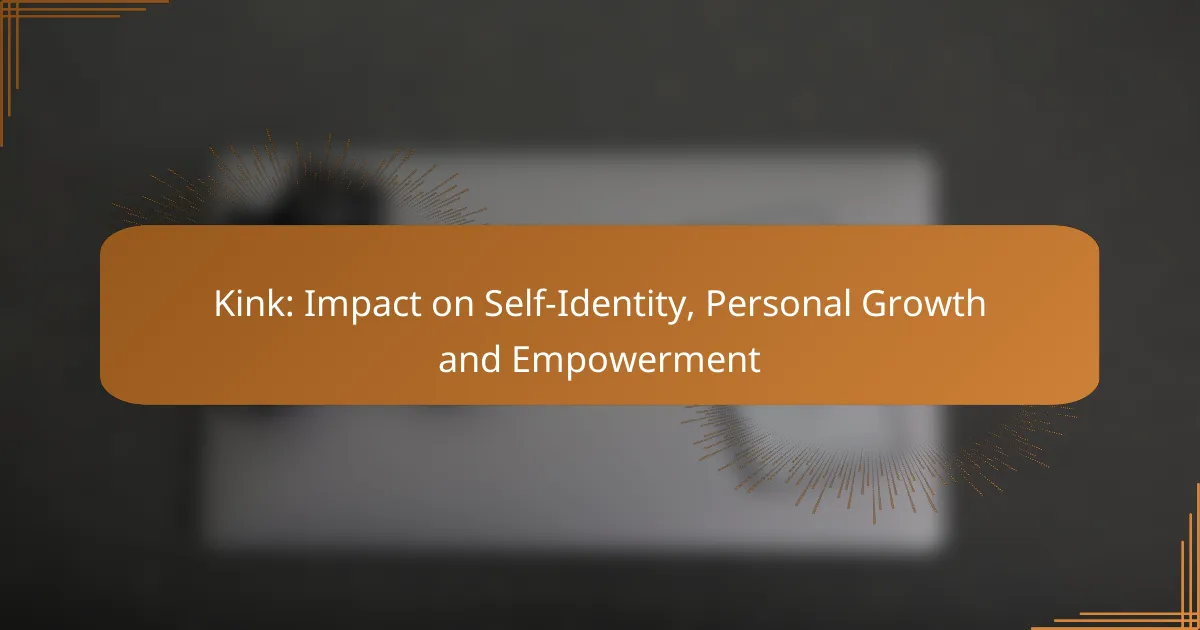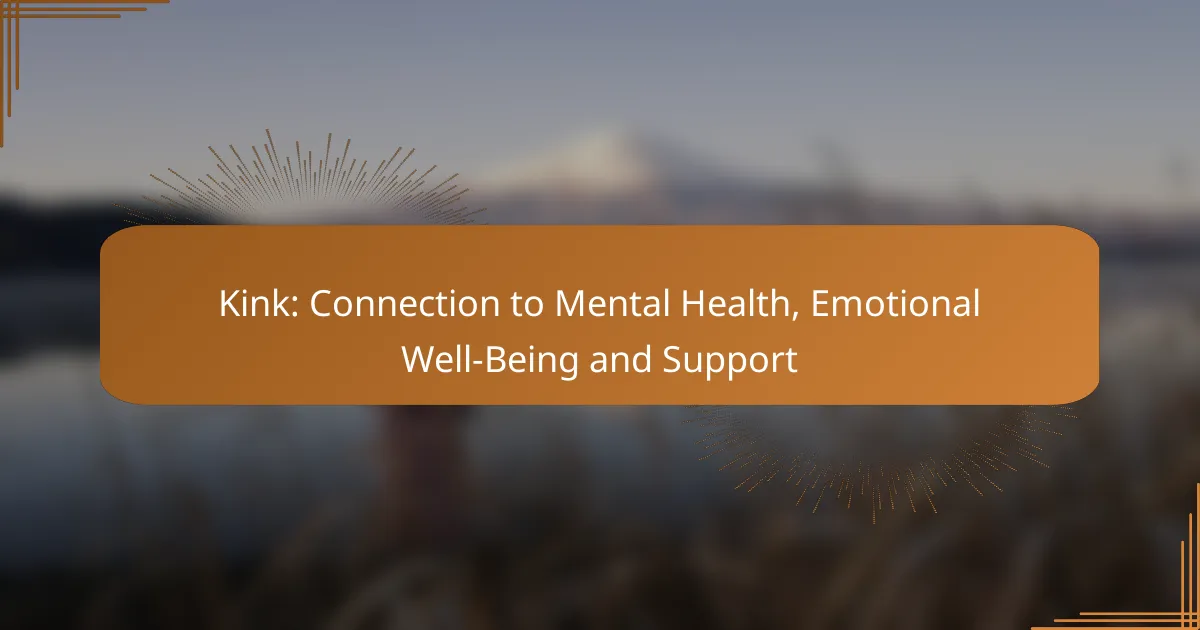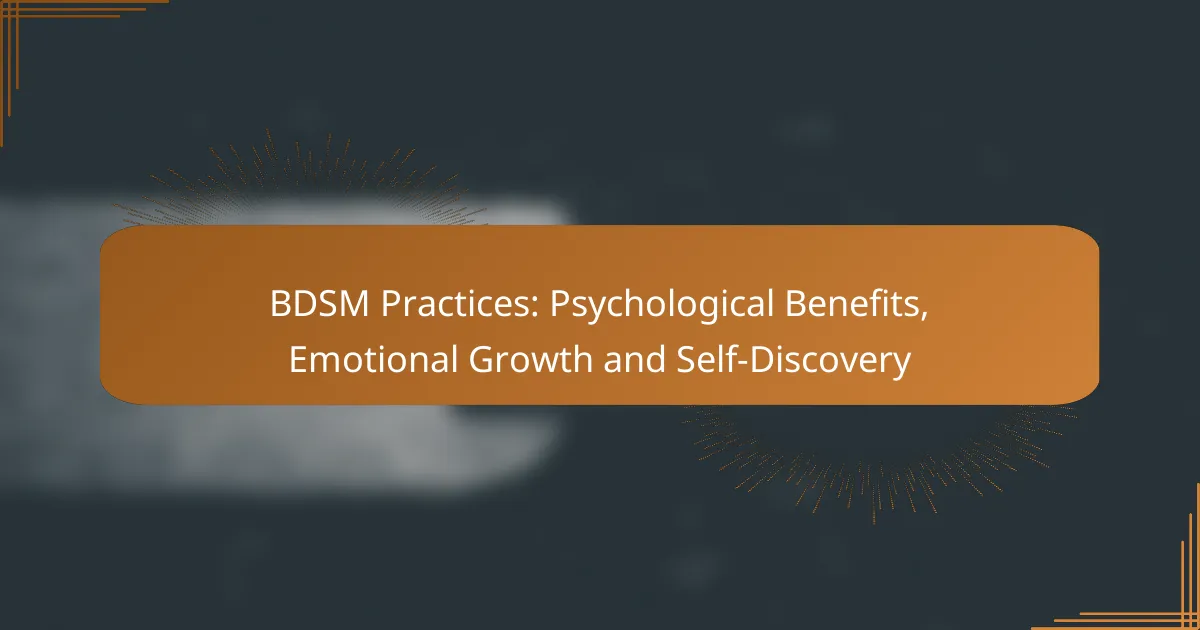Kink serves as a powerful avenue for individuals to explore and express their desires, ultimately shaping their self-identity. Through consensual practices, participants often experience profound personal growth, enhanced self-awareness, and increased confidence, leading to a greater sense of empowerment and control over their lives.

How does kink influence self-identity?
Kink can significantly shape self-identity by allowing individuals to explore and express their desires, preferences, and boundaries. Engaging in kink often leads to a deeper understanding of oneself and can foster personal growth and empowerment.
Exploration of personal identity
Through kink, individuals often embark on a journey of self-discovery, uncovering aspects of their personality that may have remained hidden. This exploration can involve trying out different roles, dynamics, and practices, which can reveal new facets of one’s identity. For many, this process is liberating and can enhance self-awareness.
For example, someone who identifies as a submissive may find that embracing this role helps them understand their need for trust and vulnerability. Conversely, a dominant may discover leadership qualities they were previously unaware of.
Integration into social identity
Kink can also play a crucial role in how individuals integrate their sexual preferences into their broader social identity. By participating in kink communities, people can connect with others who share similar interests, which can validate their experiences and help them feel less isolated. This social integration often leads to a stronger sense of belonging.
Many find that openly identifying as part of the kink community allows them to embrace their sexuality without shame, positively impacting their overall self-image and social interactions.
Impact on self-acceptance
Engaging in kink can foster greater self-acceptance by encouraging individuals to embrace their desires and preferences without judgment. This acceptance often comes from understanding that kink is a consensual and safe way to explore sexuality, which can alleviate feelings of guilt or shame. As individuals become more comfortable with their kinks, they may experience increased confidence.
Moreover, the supportive nature of kink communities can reinforce this acceptance, as members often celebrate diversity and encourage self-exploration.
Connection to community
The kink community offers a unique space for connection and support, allowing individuals to share experiences, learn from one another, and form meaningful relationships. This sense of community can be especially beneficial for those who may feel marginalized or misunderstood in mainstream society. Being part of a community can provide a network of support that enhances personal growth.
Participating in workshops, events, or online forums can help individuals build connections and gain insights into their own identities while fostering a sense of belonging.
Expression of individuality
Kink provides a platform for individuals to express their unique identities and desires creatively. This expression can take many forms, from fashion choices to the development of personal rituals within kink practices. Such individuality can empower people to showcase their authentic selves, free from societal norms.
For instance, customizing gear or developing specific scenes can reflect personal tastes and preferences, reinforcing one’s identity and enhancing the overall kink experience.

What are the benefits of kink for personal growth?
Kink can significantly enhance personal growth by fostering self-exploration and empowerment. Engaging in kink practices often leads to greater self-awareness, improved communication, increased confidence, and emotional resilience.
Enhanced self-awareness
Participating in kink encourages individuals to explore their desires and boundaries, leading to a deeper understanding of themselves. This self-exploration can reveal hidden preferences and help clarify personal values.
By reflecting on their experiences, individuals can identify patterns in their behavior and emotional responses, which can be transformative. Journaling or discussing these insights with a trusted partner can further enhance this self-awareness.
Improved communication skills
Kink necessitates open and honest communication about desires, limits, and consent, which can improve interpersonal skills. Practicing these conversations in a safe environment allows individuals to become more articulate and confident in expressing their needs.
Establishing clear boundaries and negotiating scenes can translate into better communication in other areas of life, such as personal relationships and professional settings. Regular practice can help reduce anxiety around difficult conversations.
Increased confidence
Engaging in kink can boost self-esteem by allowing individuals to embrace their sexuality and desires without shame. Successfully navigating kink experiences can foster a sense of accomplishment and empowerment.
As individuals explore their limits and push past comfort zones, they often find a newfound confidence that extends beyond the kink community. This can positively influence their overall self-image and assertiveness in daily life.
Emotional resilience
Kink can help build emotional resilience by encouraging individuals to confront and process their feelings in a controlled environment. Engaging in intense experiences can teach coping strategies for managing stress and emotional challenges.
Through negotiation and aftercare, individuals learn to support themselves and others emotionally, which can strengthen relationships. This resilience can be beneficial in navigating life’s ups and downs, making individuals more adaptable and resourceful.

How can kink empower individuals?
Kink can empower individuals by fostering a sense of control and self-discovery through consensual exploration of desires. Engaging in kink allows people to express their identities, challenge societal norms, and enhance their personal growth.
Assertion of autonomy
Engaging in kink often requires individuals to assert their autonomy by making conscious choices about their desires and limits. This practice encourages a deeper understanding of personal boundaries and the importance of consent, reinforcing the idea that individuals have the right to dictate their experiences.
For example, a person may explore a new kink by clearly communicating their interests and limits with a partner, thereby taking ownership of their sexual expression. This assertion of autonomy can lead to increased confidence in other areas of life, as individuals learn to advocate for themselves more effectively.
Redefining boundaries
Kink provides a unique opportunity to redefine personal boundaries in a safe and consensual environment. Participants often engage in discussions about what they are comfortable with, which can lead to a better understanding of their own limits and preferences.
Through this exploration, individuals may discover that their boundaries are more flexible than previously thought, allowing for personal growth. For instance, someone who initially felt uncomfortable with certain activities may find empowerment in gradually expanding their comfort zone, leading to new experiences and deeper connections.
Fostering creativity
Kink encourages creativity by inviting individuals to explore fantasies and scenarios that may not fit within conventional norms. This exploration can lead to innovative ways of expressing desires and connecting with partners, enhancing the overall experience.
For instance, creating a themed scene or incorporating role-play can stimulate imaginative thinking and collaboration. This creative process not only enriches the kink experience but also translates into other aspects of life, as individuals become more open to new ideas and perspectives.

What frameworks support kink exploration?
Frameworks that support kink exploration include established principles of consent, negotiation, and community resources. These frameworks help individuals navigate their desires safely and responsibly, fostering personal growth and empowerment.
Consent and negotiation principles
Consent is the cornerstone of any kink activity, ensuring that all parties are willing participants. It should be informed, enthusiastic, and ongoing, meaning that consent can be revoked at any time. Clear communication about limits and desires is essential during the negotiation process.
When negotiating, consider using a checklist to outline interests, boundaries, and safe words. This can help clarify expectations and prevent misunderstandings. Remember that consent is not just a one-time agreement; it requires continuous dialogue throughout the experience.
Community resources and support
Community resources play a vital role in kink exploration by providing safe spaces for individuals to connect and learn. Local kink communities often host workshops, meetups, and events that promote education and support. Online forums and social media groups can also be valuable for sharing experiences and advice.
Seek out organizations that focus on kink education and advocacy, as they can offer resources such as literature, mentorship, and peer support. Engaging with these communities can enhance your understanding of kink dynamics and help you build a network of like-minded individuals.

What are common misconceptions about kink?
Common misconceptions about kink include the belief that it is inherently abusive or that it reflects a psychological disorder. In reality, kink encompasses a wide range of consensual practices that can enhance intimacy and personal expression.
Kink is always dangerous or abusive
Many people mistakenly think that kink involves non-consensual acts or is inherently harmful. However, when practiced safely and consensually, kink can foster trust and communication between partners. Establishing clear boundaries and using safe words are essential practices that help ensure a positive experience.
Kink is a sign of mental illness
Another common misconception is that engaging in kink indicates a psychological problem. In truth, many individuals who explore kink do so as a healthy expression of their sexuality. It can be a means of personal growth, allowing individuals to explore their desires in a safe and supportive environment.
Only certain people are into kink
Some believe that kink is limited to specific demographics or lifestyles. In reality, people from all walks of life may engage in kink, regardless of age, gender, or background. The diversity within the kink community reflects a broad spectrum of interests and practices, making it accessible to many.



